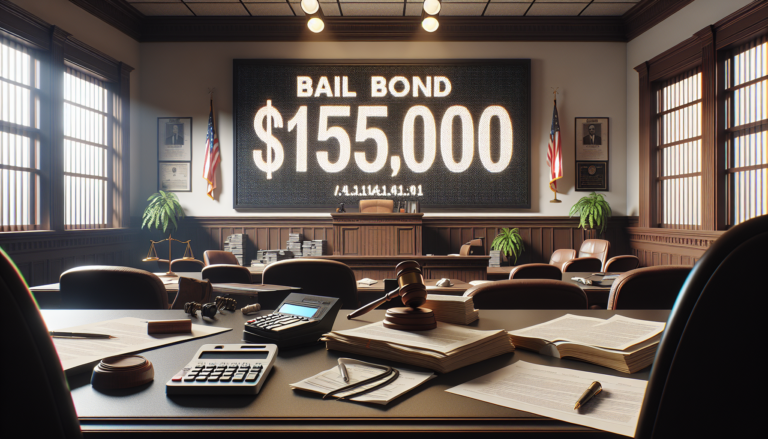When an individual is arrested and charged with a crime, they may have the opportunity to be released from jail by posting bail. Bail is a financial guarantee that the defendant will appear for their scheduled court appearances. The bail amount is set by the court and can vary widely depending on the severity of the charges and other factors. If bail is set at $150,000, many people wonder exactly how much they will need to pay to secure their release.
Understanding Bail and Its Purpose
What is Bail?
Bail is a monetary amount set by the court that allows a defendant to be released from custody while awaiting trial. It serves as a surety bond, guaranteeing that the defendant will appear for all scheduled court proceedings. The bail amount is determined based on several factors, including the severity of the charges, the defendant’s criminal history, and their perceived flight risk.
The purpose of bail is to ensure that the defendant returns to court as required while also allowing them to maintain their freedom during the legal process. If the defendant fails to appear for their court dates, they may forfeit the bail amount and face additional legal consequences.
How is Bail Amount Determined?
The bail amount is set by the court during the defendant’s initial appearance or arraignment. The judge considers various factors when determining the appropriate bail amount, such as:
- The severity of the charges
- The defendant’s criminal history
- The likelihood of the defendant fleeing or posing a danger to the community
- The defendant’s ties to the community, such as family, employment, and length of residence
In some jurisdictions, bail amounts may be predetermined by a bail schedule, which outlines standard bail amounts for specific offenses. However, judges often have the discretion to deviate from the bail schedule based on the unique circumstances of the case.
Calculating Bail Costs: If Bail is $150,000 How Much Do I Pay?
Typical Bail Premium Rates
When a defendant cannot afford to pay the full bail amount, they may seek the services of a bail bondsman. Bail bondsmen typically charge a non-refundable premium, which is a percentage of the total bail amount. The premium rates can vary by state but commonly range from 10% to 15%.
For example, if bail is set at $150,000 and the bail bondsman charges a 10% premium, the defendant or their co-signer would need to pay $15,000 to secure the bail bond. This premium is non-refundable, meaning that even if the defendant attends all court appearances and the case is resolved, the premium paid to the bail bondsman is not returned.
Example Calculation for $150,000 Bail
Let’s break down the costs for a bail amount of $150,000:
| Bail Amount | $150,000 |
|---|---|
| Bail Bondsman Premium (10%) | $15,000 |
| Total Cost to Defendant | $15,000 |
In this example, the defendant would need to pay $15,000 to the bail bondsman to secure their release. This amount represents the non-refundable premium and does not include any additional fees or collateral requirements.
Additional Costs and Fees
In addition to the bail premium, defendants may encounter other costs and fees associated with the bail process. These can include:
- Booking fees charged by the jail
- Court fees and fines
- Attorney fees for legal representation
- Collateral requirements imposed by the bail bondsman
It’s important for defendants to understand the full scope of the financial obligations they may face when seeking bail. Consulting with a bail bondsman and an attorney can help clarify these potential costs.
Options for Paying Bail
Bail Bonds and Premiums
Bail bonds are a common method for securing release when the defendant cannot afford to pay the full bail amount. The bail bondsman posts the bond on behalf of the defendant, guaranteeing their appearance in court. In exchange for this service, the bail bondsman charges a premium, typically 10% of the total bail amount.
For a $150,000 bail, the premium would be $15,000. This premium is non-refundable and represents the fee for the bail bondsman’s services. Even if the defendant attends all court appearances and the case is resolved favorably, the premium paid to the bail bondsman is not returned.
Collateral Requirements
In some cases, bail bondsmen may require collateral in addition to the premium payment. Collateral serves as additional security to ensure the defendant’s compliance with court appearances. Common forms of collateral include real estate, vehicles, jewelry, or other valuable assets.
The collateral required may depend on the bail bondsman’s assessment of the defendant’s risk and the total bail amount. For a $150,000 bail, substantial collateral may be necessary to secure the bond. If the defendant fails to appear in court, the bail bondsman may seize the collateral to recover their losses.
Flexible Payment Plans
Some bail bond companies offer flexible payment plans to help defendants manage the cost of the bail premium. Instead of requiring the full premium upfront, the bail bondsman may allow the premium to be paid in installments over a specified period.
For example, for a $150,000 bail with a $15,000 premium, the bail bondsman may offer a payment plan where the defendant pays $5,000 upfront and the remaining balance over several months. This can provide some financial relief for defendants who may struggle to pay the full premium immediately.
It’s important to discuss payment options with the bail bondsman and carefully review the terms of any financing agreement. Defaulting on premium payments can have serious consequences, including the revocation of the bail bond and the defendant’s return to custody.
Finding the Right Bail Bondsman
What to Look for in a Bail Bondsman
When searching for a bail bondsman, consider the following factors:
- Licensing and accreditation: Ensure the bail bondsman is properly licensed and in good standing with the state regulatory agency.
- Experience: Look for a bail bondsman with a track record of successfully assisting clients with the bail process.
- Availability: Choose a bail bondsman who is accessible 24/7 to handle emergencies and provide prompt service.
- Reputation: Research the bail bondsman’s reputation through online reviews, testimonials, and recommendations from attorneys or other professionals.
Selecting a reputable and experienced bail bondsman can help ensure a smoother bail process and provide peace of mind during a stressful time.
Questions to Ask a Bail Bondsman
When consulting with a bail bondsman, ask the following questions:
- What is your premium rate, and are there any additional fees?
- What collateral do you require, if any?
- Do you offer payment plans for the premium?
- How quickly can you post the bail bond?
- What is your process for handling court appearances and ensuring the defendant’s compliance?
- What happens if the defendant fails to appear in court?
Getting clear answers to these questions can help you make an informed decision when selecting a bail bondsman and understand your responsibilities in the bail process.
When bail is set at $150,000, the cost to the defendant can be significant. Understanding the bail process, premium rates, and potential additional costs is crucial for making informed decisions. Defendants should carefully consider their options, including securing a bail bond, exploring payment plans, and providing collateral when necessary.
Working with a reputable bail bondsman can help navigate the complexities of the bail system and ensure a smoother process. By asking the right questions and understanding the terms of the bail agreement, defendants can make the best choices for their unique situation.
While the cost of bail can be substantial, it is an important investment in securing freedom while awaiting trial. With the right knowledge and support, defendants can successfully navigate the bail process and focus on building a strong defense for their case.
See also:






